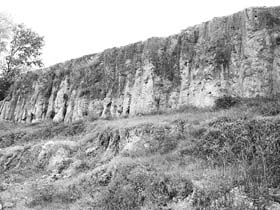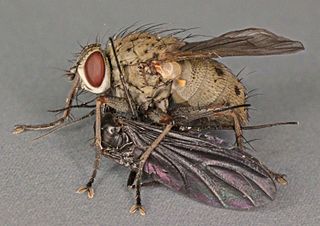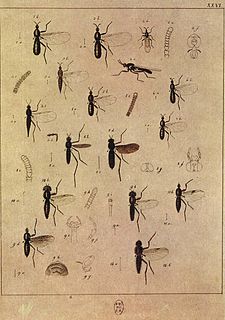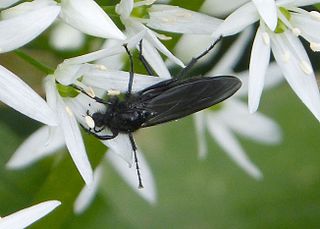
Thallium (81Tl) has 41 isotopes with atomic masses that range from 176 to 216. 203Tl and 205Tl are the only stable isotopes and 204Tl is the most stable radioisotope with a half-life of 3.78 years. 207Tl, with a half-life of 4.77 minutes, has the longest half-life of naturally occurring Tl radioisotopes. All isotopes of thallium are either radioactive or observationally stable, meaning that they are predicted to be radioactive but no actual decay has been observed.

Tipula hortorum is a species of cranefly which is widespread throughout the West Palaearctic.It is a woodland species.

Tipula unca is a species of cranefly.

Rhamphomyia flava is a species of dance flies, in the fly family Empididae. It is found in most of Europe, except the Iberian Peninsula and most of the Balkan Peninsula.

Bara is a village in Rupnagar District in Punjab, India. The village has mainly two Jatt Sikh surnames Chakkal and Heer and lies on the Rupnagar-Morinda Road at the left bank of a seasonal monsoon rivulet called Budki Nadi, about four kilometers south-west of the city Ropar and 40 km (25 mi) northeast of Chandigarh on National Highway 205 (India) (NH-205). Bara is the site of significant archeological excavations connected with the Indus Valley civilization. It has some evidence of being home to a culture that was a pre-Harappan strand of the Indus Valley Civilization. Baran and Harappan cultures may have intertwined and coexisted in some places, such as Kotla Nihang Khan, also in modern-day Punjab.

Sylvicola fenestralis, the window gnat, is a medium gnat (6–10 mm) of the family Anisopodidae. It is found in the Palearctic.
The Colombo Journal was a short-lived English-language bi-weekly newspaper in Ceylon. The newspaper started on 1 January 1832 with George Lee as editor. George Lee was the Superintendent of the Government Press and later Postmaster General. The newspaper had the support of the government and Governor Robert Wilmot-Horton. Apart from Horton and Lee other senior government officials who wrote for the newspaper included the governor's private secretary Henry Tufnell and George Turnour. Criticism of the British government led to the newspaper being closed by the Colonial Office on 31 December 1833.

Chaoborus flavicans is a species of fly in the family Chaoboridae. It is found in the Palearctic.

Chironomus anthracinus is a species of fly in the family Chironomidae. It is found in the Palearctic.

Coenosia tigrina is a species of fly in the family Muscidae. It is found in the Palearctic.
Pipunculus campestris is a species of fly in the family Pipunculidae. It is found in the Palearctic.

Scatopse notata is a species of fly in the family Scatopsidae. It is found in the Palearctic.

Ornithomya avicularia is a species of fly in the family Hippoboscidae. It is found in the Palearctic.

Phaenopsectra flavipes is a species of fly in the family Chironomidae. It is found in the Palearctic.

Prodiamesa olivacea is a species of fly in the family Chironomidae. It is found in the Palearctic.

Sapromyza quadripunctata is a species of fly in the family Lauxaniidae. It is found in the Palearctic.

Nephrotoma flavescens is a species of fly in the family Tipulidae. It is found in the Palearctic.

Dilophus febrilis is a species of feverfly the family Bibionidae. It is found in the Palearctic.

Cricotopus bicinctus is a species of fly in the family Chironomidae. It is found in the Palearctic.

Renocera stroblii is a species of fly in the family Sciomyzidae. It is found in the Palearctic


















